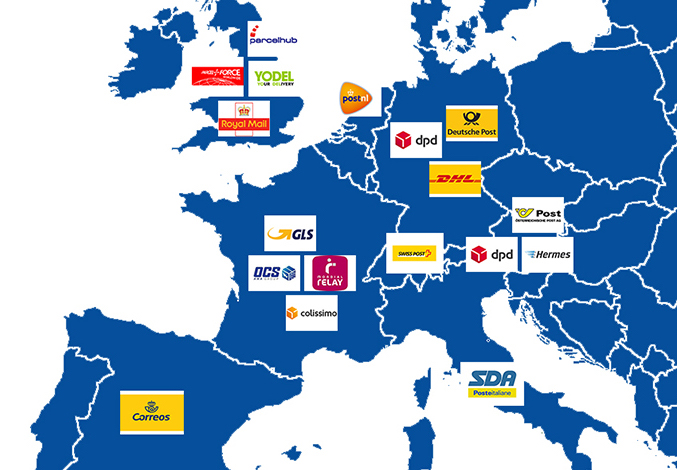Logistics response to Covid

In March 2020, with the outbreak of the pandemic, millions of people around the world found themselves locked in their homes, without the possibility of moving and traveling: a huge shock for a globalized society like ours. Among the different sectors involved, there is also logistics, whose balances suddenly changed. In the first months of the pandemic, when many firms shut down or downsized, logistics continued to contribute to the supply of primary and secondary goods. Not just towards supermarkets, but also towards eCommerce channels, due to the shopping rush. But how was it possible to manage these huge flows of goods despite the ongoing lockdown? In each country, each courier has worked to implement solutions and help workers and citizens. At San Marino Mail Italia we have relied on each courier, managing a network of more than 20 partners throughout Europe. Thanks to this business model we have been able to guarantee the delivery of our customers’ goods, relying on the most efficient distributors based in their destination country. Below some brief descriptions of how our partners have faced the situation, getting involved with innovative initiatives and ideas.
Deutsche Post – Germany
The German leading postal group has not only never stopped working to send letters and parcels all over the world, but it has also made some efforts to support small traders. Shops and local businesses were the most affected by the economic crisis resulting from the lockdown. Many have relied on digital to continue working, opening up to delivery services or to eCommerce world. Starting from scratch in online commerce, however, is no easy task. For this reason Deutsche Post decided to offer a free consultancy service for all those wishing to start an eCommerce. A precious help that gave hope and made merchants in difficulty feel better.
GLS France – France
France has been one of the hardest hit countries. However, the largest French distributor was not discouraged, tackling the situation in a logical and rational way. When everything seemed to change from day to day, GLS France relied on the objectivity of data. The various metrics on delivery percentages and number of packages handled were constantly monitored, in order to implement the continuous updates necessary for the package distribution flows.
Yodel – United Kingdom
Yodel is a distributor mainly active in the United Kingdom, where it covers every geographic region, including islands. During the lockdown there was a surge in the number of packages handled: despite this, the level of service has always been high, with a satisfaction rate of 93%. Yodel, after the most critical phase, also paid attention to the feedback of those who had relied on their services. In May 2020, a survey which involved 3,188 people was conducted. It emerged that the lockdown altered customers’ perception of delivery; over 90% agreed that drivers provided essential service. Buyer priorities changed during the lockdown. Nearly 90% of customers earlier this year had rated next-day delivery as an important factor for online shopping, but this figure has dropped by more than 30% since the start of the block. Other services that have also lost in importance included free delivery and timely delivery of goods.
Colissimo – France
Colissimo is among the first couriers in France, specializing in eCommerce shipments. Also for this reason the volume of shipments handled in the months between March and May was very high. It was therefore necessary to make efforts in order to guarantee maximum safety. Like many other distributors, contactless delivery has been activated. At the same time, it was necessary to limit the maximum weight of the packages to 30kg, in order to guarantee their transport while maintaining safety distances. In addition, to help those who were away from their home for health reasons, the time limits in case of parcel storage in post offices have been increased from 15 to 30 days.
Correos – Spain
After the declaration of a state of emergency on March 14th, the Spanish company worked to continuously guarantee the provision of the Universal Postal service; only strictly essential personnel were operational. A total of 929,183 masks, over 5,348,000 gloves, approximately 466,000 disinfectant wipes and 15,710 liters of hydroalcoholic gels were distributed to the 163,665 carriers that remained active throughout Spain. Additionally, 5,117 social distancing barriers have been installed in offices across the country. All of this has enabled it to work safely, serving 88,000 people and managing 5,435,217 shipments through its network of 2,395 post offices throughout Spain. Very high numbers, that have not affected the efficiency of essential mail services.
Hermes – Germany
Hermes is one of the largest distributors operating in Germany. During the emergency, attention was not paid only to delivery, but also to warehouse management systems. The distribution centers, where packages are sorted, have in fact a high concentration of personnel. In order to avoid crowds, a series of innovative measures have been implemented based on two keywords: automation and innovation. These solutions provided for an optimization of space, avoiding as much as possible that the packages were kept in stock, occupying precious space. Particular attention was paid to urban warehouses and to the use of electric vehicles for city deliveries. As last-mile deliveries are increasingly made with green vehicles, Hermes has been working towards the creation of charging stations in strategic points that could be crucial in the future.
Sources of data:
https://www.deutschepost.de/de.html
https://gls-group.eu/FR/fr/gls-france
https://www.yodel.co.uk/
https://www.laposte.fr/outils/monitoraggio-dei-pacchi
https://www.correos.com/
https://www.myhermes.co.uk/